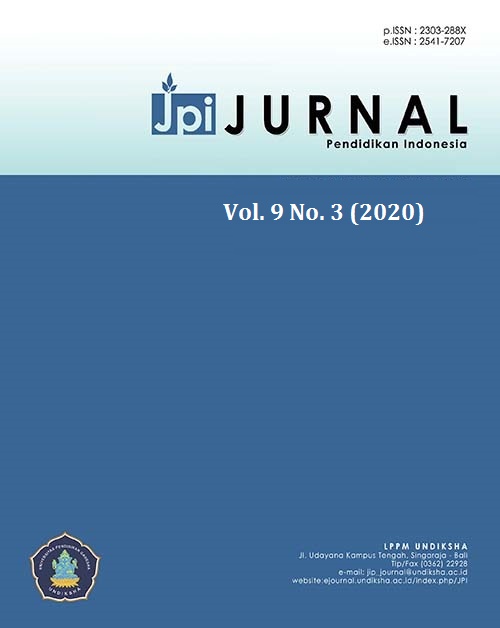Reducing Radicalism as a Form of Intervention Through the Role of School and Education Curriculum
DOI:
https://doi.org/10.23887/jpi-undiksha.v9i3.22601Keywords:
Education, curriculum, radicalism, criminology, age graded theory of crimeAbstract
Radicalism become a severe problem for the peace and security of society in Indonesia. So, it is necessary to optimize the role of educational institutions in preventing and offering alternative solutions to the movement of negative radicalism through dialogue and education in schools, from elementary to higher education level. This study aims to examine the role of school and education curriculum as an effort in reducing radicalism. This research is a qualitative study which uses in-depth interviews and literature studies in gathering data. The analysis was carried by using the age graded theory of crime. The results show that school and education curriculum have a role in reducing radicalism. School is a social institution that is very important in each phase of individual growth because schools have a huge role in carrying out positive social values. Therefore, the education curriculum can be arranged in reducing radicalism in society by increasing the portion of cultural values, humanity, tolerance, and the attachment of individuals to their environment.
References
Berrebi, C. (2007). Evidence About the Link Between Education, Poverty and Terrorism Among Palestinians. Peace Economics, Peace Science and Public Policy, 13(1), 18–53. https://doi.org/10.2202/1554-8597.1101
Bjørgo, T. (2018). Routledge Handbook of Terrorism and Counterterrorism (A. Silke (ed.)). Routledge.
Botticher, A. (2017). Towards Acedemics Consensus Definition of Radicalism and Extremism. Perspectives on Terrorism, 11(4), 73–77. http://www.terrorismanalysts.com/pt/index.php/pot/article/view/623/html
Christopel, C., & Kuntoro, S. A. (2016). Pemahaman nilai-nilai demokrasi siswa melalui metode inquiri pada pembelajaran Pkn di SMA Negeri 1 Gamping Sleman. Harmoni Sosial. Jurnal Pendidikan IPS, 3(1), 14–26. https://doi.org/10.21831/hsjpi.v3i1.9697
De Mesquita, E. B. (2005). The Quality of Terror. American Journal of Political Science, 49(3), 515–530. https://doi.org/10.1111/j.1540-5907.2005.00139.x
Faridah, I. F. (2013). Toleransi Antarumat Beragama Masyarakat Perumahan. Komunitas: International Journal of Indonesian Society and Culture, 5(1), 14–25. https://doi.org/10.15294/komunitas.v5i1.2368
Fedotova, O. (2013). Radicalism and Terrorism Problems in a Scientific Discourse of Russian Social Sciences. Procedia - Social and Behavioral Sciences, 334–343. https://doi.org/10.1016/j.sbspro.2013.08.681
Hibban, I. (2016). Radikalisme Agama Dalam Kajian Sosiologi. Jurnal Sosiologi Reflektif, 9(1), 219–223. https://conference.uin-suka.ac.id/isoshum/sosiologireflektif/article/view/1128
Infid. (2018). A Cross-Country Report on Trends of Extrimism in South and South-East Asia. International NGO Forum on Indonesian Development.
Jacob, J. C. (2010). Pathways of Crime and Delinquency: A life-course Analysis of Informal Social Control of Antisocial Behaviour. University of Waterloo.
Maghfur, M., & Muniroh, S. M. (2013). Women Behind Terrorists (Religiousity, Self Adaptation and Husband-Wife Relationship within Suspected Terrorists Family in Pekalongan). Analisa: Journal of Social Science and Religion, 20(2), 181–195. https://doi.org/10.18784/analisa.v20i2.175
Mahfud, C., Prasetyawati, N., Wahyuddin, W., Muhibbin, Z., Agustin, D. S. Y., & Sukmawati, H. (2018). Religious Radicalism, Global Terrorism and Islamic Challenges in Contemporary Indonesia. Jurnal Sosial Humaniora (JSH), 11(1), 8–18. https://doi.org/10.12962/j24433527.v11i1.3550
Mulyadi, M. (2017). Peran Pemuda dalam Mencegah Paham Radikalisme. Prosiding Seminar Nasional Program Pascasarjana Universitas PGRI Palembang, 248–255. https://jurnal.univpgri-palembang.ac.id/index.php/Prosidingpps/article/view/1457
Nursalim, M. (2014). Deradikalisasi Terorisme: Studi Atas Epistemologi, Model Interpretasi dan Manipulasi Pelaku Teror. Kalam : Jurnal Studis Agama Dan Pemikiran Islam, 8(2), 329–346. https://doi.org/10.24042/klm.v8i2.230
Sampson, R. J., & Laub, J. H. (1997). A life-course theory of cumulative disadvantage and the stability of delinquency. Developmental Theories of Crime and Delinquency, 7(1), 133–161.
Satriawan, I., Islami, M. N., & Lailam, T. (2019). Pencegahan Gerakan Radikalisme Melalui Penanaman Ideologi Pancasila dan Budaya Sadar Konstitusi Berbasis Komunitas. Jurnal Surya Masyarakat, 1(2), 99–110. https://doi.org/10.26714/jsm.1.2.2019
Schmid, A. P. (2013). Radicalisation, De-Radicalisation, Counter-Radicalisation: Conceptual Discussion and Literature Review. International Centre for Counter-Terrorism.
Shoham, S. G., Knepper, P., & Kett, M. (2010). International Handbook of Criminology. CRC Press.
Snow, D. A., & Cross, R. (2011). Radicalism Within the Context of Social Movements: Processes and Types. Journal of Strategic Security, 4(4), 115–130. https://www.jstor.org/stable/26463914?seq=1#metadata_info_tab_contents
Taşpınar, Ö. (2009). Fighting Radicalism, Not" Terrorism": Root Causes of an International Actor Redefined. SAIS Review of International Affairs, 29(2), 75–86. https://doi.org/10.1353/sais.0.0059
UNESCO. (2017). Preventing Violent Extrimism through Education: A Guidefor Policy-Makers. UNESCO.
Velias, A., & Corr, P. (2017). Effects of terrorism threat on economic preferences: The role of personality. Contemporary Voices: St Andrews Journal of International Relations, 8(2), 62–72. https://jtr.st-andrews.ac.uk/article/10.15664/jtr.1305/
Y.H.Wong, M., VinodKhiatanib, P., & HongChui, W. (2019). Understanding Youth Activism and Radicalism: Chinese Values and Socialization. The Social Science Journal, 56(2), 255–267. https://doi.org/10.1016/j.soscij.2018.08.006
Downloads
Published
Issue
Section
License
Authors who publish with the Jurnal Pendidikan Indnesia agree to the following terms:
- Authors retain copyright and grant the journal the right of first publication with the work simultaneously licensed under a Creative Commons Attribution License (CC BY-SA 4.0) that allows others to share the work with an acknowledgment of the work's authorship and initial publication in this journal.
- Authors are able to enter into separate, additional contractual arrangements for the non-exclusive distribution of the journal's published version of the work (e.g., post it to an institutional repository or publish it in a book), with an acknowledgment of its initial publication in this journal.
- Authors are permitted and encouraged to post their work online (e.g., in institutional repositories or on their website) prior to and during the submission process, as it can lead to productive exchanges, as well as earlier and greater citation of published work. (See The Effect of Open Access)








